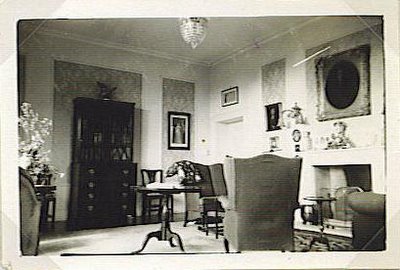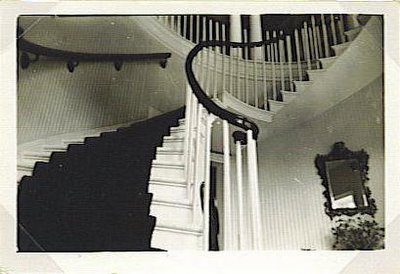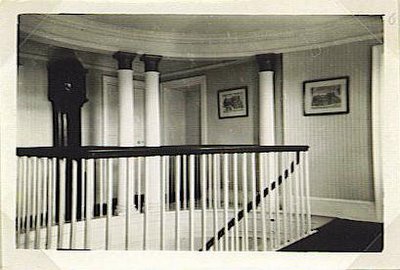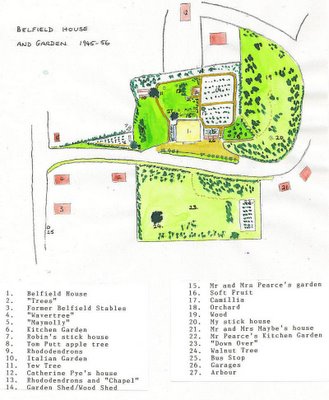BELFIELD 1945-56. (6)
Weymouth was always overcrowded with holiday-makers during the summer holidays, many of them coming by train from the North of England and the Midlands. So rather than use the beach there, we would go down to the nearest beach to Belfield at the bottom of Rylands Lane, not far from Sandsfoot Castle; about a twenty minute walk.
Rylands Lane was also unadopted, and only a few houses had so far been built there, about halfway down on the left. This area is now totally built up.
The part of the shore which we used to go to was the west of Sandsfoot Castle; a much better and sandier beach lies to the east and was used by Castle Cove Sailing Club, but that would have been further to walk. Being within Portland Harbour, the sea was always calm, but the end we used was largely rocky and covered with lots of seaweed; tiny crabs could be found in the rock pools.
Before Buxton Road was made, the old road from Weymouth to Smallmouth (the ferry link across to Portland) continued from what is now Rodwell Road and Old Castle Road and passed along this stretch of the coast. Until the line finally closed in 1965, the Weymouth to Portland branch line ran along here too.
The summer holidays were idyllic - but as in London, without central heating Belfield in the winter was exceedingly cold and we had to rely on open fires for warmth. These were usually a mixture of coal and wood, with an electric fire for background heat.

A fire would normally be lit in the Drawing Room, but if it was very cold there might be one in the smaller Octagon Room instead. When a fire was lit in the Dining Room grate, the firelight beautifully illuminated the shell surround.
An electric fire would be turned on in my bedroom at bedtime, but it was agony to leave the warmth of the fire downstairs, go into the icy Hall and up to bed. We had hot water bottles, not always reliable. There was a pre-war stone one, whose rubber washer round the stopper had perished and so was liable to leak - and the post-war rubber ones were made of inferior quality rubber, and did not last long.

My mother was fanatical about damp beds, which she would strip and air thoroughly with the aid of an electric fire when we arrived at the house on Friday nights. My clothes would get so damp overnight that steam would rise from them when aired before the fire next morning. I would even resort to getting dressed under my bedclothes rather than shiver in my icy bedroom.

There was a small triangular piece of our garden bordered on one side by Belfield Park Avenue, and on the other, behind a tall cypressus hedge, by the garden of a house called "Maymolly". In 1945, a surveyor in Weymouth, acting on behalf of the owner of "Maymolly", had written to my father asking if he would be willing to sell this piece of land to hin, in order to "square up" his own land. My father had refused to sell, and as far as I know that was the end of the matter.
Some years later when I was playing on the lawn one day, I noticed a small boy, aged about five, watching me rather wistfully across the railing from the garden of "Maymolly". After a while I went across to talk to him. He told me his name was Robin, and I invited him to climb over the low railing to come and play with me.
I showed him all round the garden and into the wood on the other side of the house where I had built myself a shelter of sticks, very much like Eeyore's House at Pooh Corner.
Robin was most impressed, and begged me to help him build one like it in his garden, insisting his parents would not mind. So we collected together the longest sticks we could find (probably some of Mr W-----'s pea-sticks), and we started to build another stick house in the corner of Robin's garden, just over the railing from ours. It was well hidden, just where the cypressus hedge met the easily climbed over iron railing.
We had almost finished when the bell rang for me to return home for my lunch, so we agreed to meet there again after lunch.
We had not been back there for long before an extremely angry woman, who announced herself as being Robin's mother, came storming into view.
"I don't know who you are or where you've come from", she told me, "but how dare you come into my garden and create this hideous mess. I cannot think what the people next door must think."
I did not let on that "the people next door" were my parents who, I was sure, couldn't care less! I tried to explain that Robin had asked me to build him a house and this was it, whereupon she flared back at me saying that Robin was only a baby and too young to understand such matters so couldn't be blamed. She gave me five minutes to clear everything away, to clear out and never dare come back - then marched back to her house with Robin, who had not said a word, in tow.
Feeling like some desperate criminal, I quickly dismantled the stick house, flung everything back over the railing to my side, and did a quick disappearing act, hiding in bushes some distance away, from where I could watch the return inspection in safety.
I never told my parents what had happened and I did not want her to discover who I was, so unless Robin told her - and she might not have believed him - it must have remained a mystery as to where this awful urchin had vanished with all the rubbish I had brought with me.
I never saw Robin or his mother again.

Belfield House and garden, 1945-56.
Click the diagram to enlarge it to full size.
On the other side of the kitchen garden from "Maymolly" was an old "Tom Putt" apple tree. It produced a crop of small apples, but most of them were infected with a type of worm which burrowed in under the skin. So much of the apple had to be cut out before eating that they were hardly worth the bother.
However, about half of its branches overhung the road, and the sight of apples was irresistible to the gang of small boys who would come along and throw stones, trying to get them down. My father used to get very annoyed about this because a) the boys were stealing, even if the apples were practically inedible, and b) because there were cold frames near the tree in which Mr W----- grew cucumbers, squash and melons, and he feared the glass would get broken.
One day he managed to catch a handful of these boys in the act, and marched them up to the house where he lined them up in front of his desk and gave them a severe ticking off. They came from a nearby Approved School (a type of reformatory school).
<< Previous post · First post · Next post >>
Rylands Lane was also unadopted, and only a few houses had so far been built there, about halfway down on the left. This area is now totally built up.
The part of the shore which we used to go to was the west of Sandsfoot Castle; a much better and sandier beach lies to the east and was used by Castle Cove Sailing Club, but that would have been further to walk. Being within Portland Harbour, the sea was always calm, but the end we used was largely rocky and covered with lots of seaweed; tiny crabs could be found in the rock pools.
Before Buxton Road was made, the old road from Weymouth to Smallmouth (the ferry link across to Portland) continued from what is now Rodwell Road and Old Castle Road and passed along this stretch of the coast. Until the line finally closed in 1965, the Weymouth to Portland branch line ran along here too.
The summer holidays were idyllic - but as in London, without central heating Belfield in the winter was exceedingly cold and we had to rely on open fires for warmth. These were usually a mixture of coal and wood, with an electric fire for background heat.

A fire would normally be lit in the Drawing Room, but if it was very cold there might be one in the smaller Octagon Room instead. When a fire was lit in the Dining Room grate, the firelight beautifully illuminated the shell surround.
An electric fire would be turned on in my bedroom at bedtime, but it was agony to leave the warmth of the fire downstairs, go into the icy Hall and up to bed. We had hot water bottles, not always reliable. There was a pre-war stone one, whose rubber washer round the stopper had perished and so was liable to leak - and the post-war rubber ones were made of inferior quality rubber, and did not last long.

My mother was fanatical about damp beds, which she would strip and air thoroughly with the aid of an electric fire when we arrived at the house on Friday nights. My clothes would get so damp overnight that steam would rise from them when aired before the fire next morning. I would even resort to getting dressed under my bedclothes rather than shiver in my icy bedroom.

There was a small triangular piece of our garden bordered on one side by Belfield Park Avenue, and on the other, behind a tall cypressus hedge, by the garden of a house called "Maymolly". In 1945, a surveyor in Weymouth, acting on behalf of the owner of "Maymolly", had written to my father asking if he would be willing to sell this piece of land to hin, in order to "square up" his own land. My father had refused to sell, and as far as I know that was the end of the matter.
Some years later when I was playing on the lawn one day, I noticed a small boy, aged about five, watching me rather wistfully across the railing from the garden of "Maymolly". After a while I went across to talk to him. He told me his name was Robin, and I invited him to climb over the low railing to come and play with me.
I showed him all round the garden and into the wood on the other side of the house where I had built myself a shelter of sticks, very much like Eeyore's House at Pooh Corner.
Robin was most impressed, and begged me to help him build one like it in his garden, insisting his parents would not mind. So we collected together the longest sticks we could find (probably some of Mr W-----'s pea-sticks), and we started to build another stick house in the corner of Robin's garden, just over the railing from ours. It was well hidden, just where the cypressus hedge met the easily climbed over iron railing.
We had almost finished when the bell rang for me to return home for my lunch, so we agreed to meet there again after lunch.
We had not been back there for long before an extremely angry woman, who announced herself as being Robin's mother, came storming into view.
"I don't know who you are or where you've come from", she told me, "but how dare you come into my garden and create this hideous mess. I cannot think what the people next door must think."
I did not let on that "the people next door" were my parents who, I was sure, couldn't care less! I tried to explain that Robin had asked me to build him a house and this was it, whereupon she flared back at me saying that Robin was only a baby and too young to understand such matters so couldn't be blamed. She gave me five minutes to clear everything away, to clear out and never dare come back - then marched back to her house with Robin, who had not said a word, in tow.
Feeling like some desperate criminal, I quickly dismantled the stick house, flung everything back over the railing to my side, and did a quick disappearing act, hiding in bushes some distance away, from where I could watch the return inspection in safety.
I never told my parents what had happened and I did not want her to discover who I was, so unless Robin told her - and she might not have believed him - it must have remained a mystery as to where this awful urchin had vanished with all the rubbish I had brought with me.
I never saw Robin or his mother again.

Click the diagram to enlarge it to full size.
On the other side of the kitchen garden from "Maymolly" was an old "Tom Putt" apple tree. It produced a crop of small apples, but most of them were infected with a type of worm which burrowed in under the skin. So much of the apple had to be cut out before eating that they were hardly worth the bother.
However, about half of its branches overhung the road, and the sight of apples was irresistible to the gang of small boys who would come along and throw stones, trying to get them down. My father used to get very annoyed about this because a) the boys were stealing, even if the apples were practically inedible, and b) because there were cold frames near the tree in which Mr W----- grew cucumbers, squash and melons, and he feared the glass would get broken.
One day he managed to catch a handful of these boys in the act, and marched them up to the house where he lined them up in front of his desk and gave them a severe ticking off. They came from a nearby Approved School (a type of reformatory school).
<< Previous post · First post · Next post >>


0 Comments:
Post a Comment
<< Home